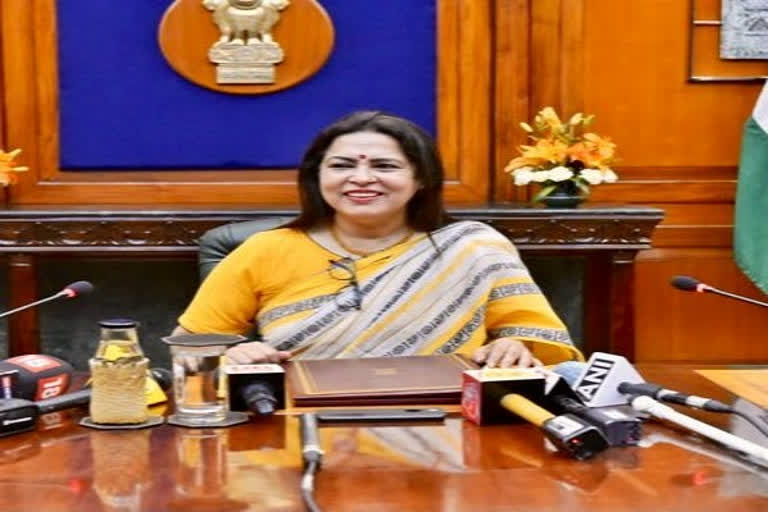New Delhi: India has been a victim of terrorism, particularly cross-border terrorism, by UN-designated terrorist groups, such as Lashkar-e-Taiba, Harkat-ul-Mujahidin, and Jaish-e-Mohammad, as well as their aliases and proxies, said MoS MEA Meenakshi Lekhi on Tuesday.
Addressing the high-Level International Conference on Human Rights, Civil Society and Counter-Terrorism in Spain, Lekhi said, "For the last several decades, India has been a victim of terrorism, particularly cross-border terrorism, by UN-designated terrorist groups, such as Lashkar-e-Taiba, Harkat-ul-Mujahidin, and Jaish-e-Mohammad, as well as their aliases and proxies."
She recalled the memories of the horrors of the 2001 Parliament Attack, 2005 Delhi bombings, 2008 Mumbai, the 2016 Pathankot and Uri and the 2019 Pulwama terror attacks are still afresh. She noted that it is regretful that while the victims of many of these dastardly terrorist attacks are yet to get justice, the perpetrators, facilitators and financiers of these attacks continue to walk free under state support and hospitality.
Also Read: India fully supportive of Sri Lanka's democracy and economic recovery: MEA
"Such double standards need unequivocal condemnation from the international community, especially when terrorism is used as an instrument of State´s Foreign Policy", she added. Paying tribute to the victims of terrorism and their families for their pain, suffering and losses, Meenakshi Lekhi pointed out that terrorism is the biggest violator of human rights.
It seriously impairs the enjoyment of human rights, jeopardizes peace and security, extracts a huge human toll and threatens our social fabric and economic development. She reiterated that terrorism remains the most significant threat to international peace and security and can only be defeated by a collective fight against it. "It is important that we refrain from labelling terrorism based on political motivations. Terrorists are no angels", said Lekhi.
-
Happy to participate at the UN High-Level International Conference on Human Rights, Civil Society & Counter-Terrorism at Malaga, Spain. Highlighted that terrorism is the biggest violator of human rights. India has been a victim of terrorism, particularly cross-border terrorism. pic.twitter.com/M81xFVecia
— Meenakashi Lekhi (@M_Lekhi) May 10, 2022 " class="align-text-top noRightClick twitterSection" data="
">Happy to participate at the UN High-Level International Conference on Human Rights, Civil Society & Counter-Terrorism at Malaga, Spain. Highlighted that terrorism is the biggest violator of human rights. India has been a victim of terrorism, particularly cross-border terrorism. pic.twitter.com/M81xFVecia
— Meenakashi Lekhi (@M_Lekhi) May 10, 2022Happy to participate at the UN High-Level International Conference on Human Rights, Civil Society & Counter-Terrorism at Malaga, Spain. Highlighted that terrorism is the biggest violator of human rights. India has been a victim of terrorism, particularly cross-border terrorism. pic.twitter.com/M81xFVecia
— Meenakashi Lekhi (@M_Lekhi) May 10, 2022
She opined that there is a need to distinguish between the political ideologies which are part of a pluralistic democratic polity and radical ideologies which subscribe to terrorism. To paint them with the same brush is inaccurate and counterproductive. Lekhi highlighted that Afghanistan is once again at the risk of becoming a haven for Al-Qaida, ISIL and several other UN-designated terrorist groups, such as Lashkar-e-Taiba and Jaish-e-Mohammed.
"From the oceans to biosphere and from outer space to cyberspace, the global common requires ethical principles for their equitable, responsible and sustainable use. States need to acknowledge the ability of non-state actors to use ICT, emerging technologies such as social media, new payment methods, video games, encrypted messaging services, cryptocurrencies, drones, bio-warfare etc. for terrorist purposes", said MoS MEA Lekhi.
The same has emerged as a serious concern as most countries do not have adequate response capabilities to counter these threats. Non-state actors are using the tools of globalisation and are cutting through the artificial barriers of borders and are forming coalitions across the border challenging democratic nation-states, she reiterated.
She urged the need to strengthen the international legal framework by early adopting of Comprehensive Convention on International Terrorism thereby defining terrorism, prosecuting terrorists under special laws and making cross border terrorism an extraditable offence globally.
Also Read: India, Australia call for international cooperation to combat terrorism
India gives priority to the work done by civil society in the prevention of terrorism and rehabilitation of victims of terrorism and adheres to the principles that activities of civil society organizations remain impartial, their functions transparent and apolitical. Lekhi said that there is a need to remain vigilant to the risk posed by fake NGOs and charities which support and cause illegitimate activities.
"We will continue to support UNOCT and UNCTED including in our capacity as Chair of the UN Counter-Terrorism Committee", she noted while adding that India's fight against terrorism is as strong as the weakest link in the global chain of member states. "If we all see the threat of terrorism without borders, it would necessitate coordinated and without borders response from all the member states in the spirit of zero tolerance to terrorism. I wish all the member states freedom from the menace of terrorism", she said.



